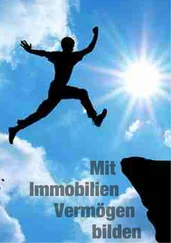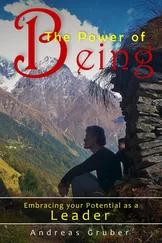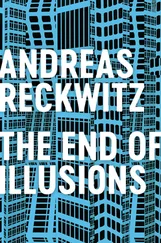No, says J, explaining that he’s on his way to Forsthaus Winterstein and just happened to pass by, that he wants to go to the Forsthaus because the hunt was there this week, a really big hunt up in the forest, all the way to Mörlen, the biggest hunt there’s been in a long time.
And while the Maiwald family occupies itself with the apples which are lying around on the ground, green and yellow and predominantly red, the guests in the courtyard look on. Julia is on her knees now and picking apples up from under the trailer, one hand on the ground to support herself and the other collecting, a basket next to her. So now J is standing there in the yard, the Maiwald yard, and he’s sure to be transfixed by the tractor or at least the apple press at the back of the yard, which is ready for action but won’t be used today, and for sure he would have loved to find out how the press works and how it’s operated and which pump gets used to pump down into the cellar and so on and so on, but now Julia is on her knees collecting apples, and everything around J sinks into nothingness, a blackness against which just one thing stands out in sharp relief: Julia on her knees, harvesting apples.
How old are you now anyway? asks Bornträger, standing up from the bench.
Fifteen, Julia calls out.
Fifteen, repeats Bornträger, leaning against the wall of the barn which is just behind the bench.
Julia’s fifteen now, that’s right, says Maiwald, and in two weeks’ time she’ll be sixteen. Her birthday always comes just after the apples.
Just after the apples, repeats Bornträger as he watches Julia beneath the trailer, her deft movements no longer child-like, already very much those of a young woman.
Julia, says Maiwald, is our apple girl.
Apple girl, repeats Bornträger. J stands behind Julia, his eyes sticking out of his head.
And now she stands up again and smiles. She smiles at him or Bornträger, or simply smiles out into the world, and my uncle falls into a transfixed state, one which can only pass when Julia disappears from the scene. But she clearly has no plans to do so. She lifts the basket from the ground, J standing next to her, and looks straight at him, or perhaps she looks straight though him. And now she scrambles around the trailer again and around my uncle’s feet, to pick up one or two more of the scattered apples, and all the while my uncle watches her as if he was alone in the world. Bornträger, over by the barn wall, licks his lips. The apples are all back in the trailer now, so it can be driven on. Maiwald climbs up onto the tractor and moves it off the road, driving the trailer into the yard and over to the press. The apples will be pressed tomorrow. Then Maiwald releases the trailer and drives the tractor out of the yard, to park it. His wife Christine has gone into the house now to wash her hands. Martin has gone too. Now only my uncle, Bornträger and Julia remain in the yard. She stands by the trailer and looks at the apples.
Those are very fine apples, says Bornträger, watching Julia. Were they all harvested today?
Yes, all of them, says Julia.
Then every one of the apples was held by you or your family?
Yes, every last one, says Julia.
Julia, her mother calls from inside, come in and wash your hands.
Yes, Mother, says Julia.
But now Bornträger has moved closer and is standing next to Julia by the trailer.
So you were picking apples for a really long time today, he says, do you enjoy it?
I don’t know, says Julia.
Can I touch them some time?
Julia nods hesitantly.
Will you give me an apple?
Julia nods again, still hesitant.
Come and wash your hands now, Julia, her mother calls.
Yes, in a moment, says Julia.
Look, they’re such beautiful apples, says Bornträger as he grabs them, one eye on the yard to see if Maiwald is coming back.
Julia stares straight ahead, into one of the corners of the yard. J stands there and marvels once more at what other people are capable of. Perhaps, in a moment, Bornträger will ask him if he wants to touch the apples too, in which case J would probably do it, with both hands, or perhaps they would suddenly leap on the girl and ravage her from top to bottom in the matter of a mere second, but now her mother is calling for the third time, Come in right this minute!
I should go in, says Julia, gazing into the aforementioned corner of the yard, then quietly directs the retort idiot at Bornträger and goes in to wash her hands.
Now Maiwald comes back into the yard, and Bornträger sits there happy and content, and perhaps with a certain degree of excitement, on the bench next to the jerry can; nothing has happened, everything is fine, and Maiwald talks for a while longer with Bornträger and my uncle about the time of year, the weather, the apples, the harvest, and in the end Bornträger takes three litres of yesterday’s sweet cider with him, and my uncle gets back into his Variant, and Christine Maiwald stands with her husband in the courtyard and says, Those repellent beasts, they only come because of Julia, but it’s not like we can lock her away inside.
Maiwald: Ay, ay, I guess she’s just at that age.
My uncle drives to Frauenwald. The sun is still in the sky, just visible over the Johannisberg. Besides me, my uncle was the only person in the family who would go up to the Johannisberg to watch the sun rise from time to time. Sure, nowadays the Bad Nauheimers trek up to the mountain in their droves on New Years’ Eve to drink and stand around in their ski jackets as if they were on the slopes, despite the fact that there is never any snow on New Years’ (but it could, it could snow!), they drive their all-terrain vehicles all the way up onto the Johannisberg first, then if the upper part of the Johannisberg is already full of parked cars, they drive to the half-way point, parking in the middle of the forest road, and finally they drive to the foot of the Johannisberg, because it’s the only place they can still park, while the last ones drive home because they can’t find a parking space anywhere, then drive their all-terrain vehicles (purchased as though they have to trek across deserts and moors in the Wetterau) into the garage and head back to the Johannisberg on foot, reaching it just five minutes later and still in time for midnight, with a child clasped in one hand and a large bag containing fireworks and sparkling wine in the other. But on a normal morning, during a normal sunrise, I have hardly ever seen a Bad Nauheimer up there, and even my father would have said thank you for the invitation but that he had more important matters to attend to. Sunrises only fit into the lives of people like my father — if at all — when they set off on holiday to Italy at half past three in the morning in order to beat the early morning traffic in Frankfurt, and after that in Nuremberg. But my uncle would linger up there while the sun rose just like I do. We, the two good-for-nothings in the family, he a shift worker, I merely in despair and always walking, deeply distressed, between Bad Nauheim and Friedberg.
At first everything is black; then a blackish-blue brightening announces itself, a slow process. Later, you get the impression that it’s becoming properly blue and light, that the day has already begun even if the sunrise is yet to come, but that’s not the case, your eyes have simply become accustomed to the dark. Sometimes the light is restricted by a wall of cloud, making the rest appear completely black and the small amount of blue even brighter. Then, very quickly, the red comes, flowing into everything, into the forefront of the sky as you gaze out from the Johannisberg at the whole landscape, at the whole of the Wetterau spread out in front of you. And then, as if everything was vibrating with anticipation, as if this morning landscape was trembling, the sun suddenly appears, and now the Wetterau lies there golden and red and still sleeping, and you stand there in the cold of the morning, rubbing your hands, having forgotten that you’ve been staring at one fixed point for over half an hour, the point where you were waiting for the sun to appear. This is sunrise from the Johannisberg. Then the first lights come on, the first aeroplanes appear, then comes the rush of workers and employees, and you climb down from the Johannisberg with a sunrise that no one can ever take away from you, not for the rest of your life.
Читать дальше











